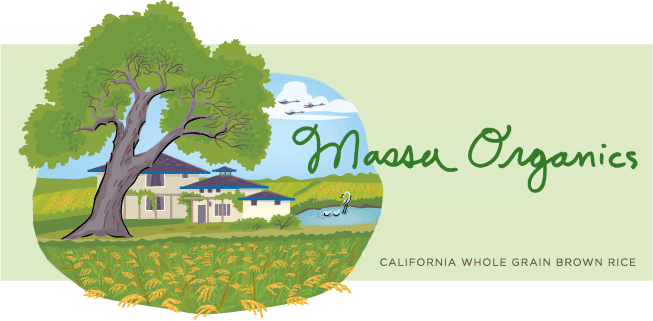Massa Organics is part of a small family farm located along the Sacramento River near Chico, California. As former biologists, we believe our farm must be an integral part of a functioning ecosystem. Farming offers a unique opportunity for hands-on conservation and social work. We strive to have positive impacts on the quality of our air, water and soil. For example, we capture and recirculate our irrigation water, plant cover crops during fallow seasons, and do not burn any crop residue. We share our land and harvests with wildlife as much as possible.
At Massa Organics, community is paramount. We wish to reconnect our farm with the greater community so that the people eating our rice will know how it was grown, and by whom. We take leadership roles in several community organizations, from grassroots farming groups & CSA's, to foster care advocacy. We also host field trips for area schools.
The health benefits of eating brown rice are numerous: it has been shown to reduce the risk of heart disease, strokes, cancer, diabetes & obesity; contains valuable antioxidants, vitamins, magnesium, iron & fiber; and is one of the most easily digested grains, ideal for those who are gluten-intolerant.
Animals on the Farm: An Agroecological Approach to Integrated Food Systems
One of our latest projects has been to integrate animals into our farming production. A guiding principle of our family philosophy is to make our agricultural fields mimic natural systems. Rice fields are essentially large, shallow ponds. We've been experimenting with raising ducks in the fields, which eat weeds and bugs and turn them into fertilizer for the plants. Introducing sheep into our almond orchard, they mimic deer and other herbivores that would graze in wild woodlands. They help to reduce the amount of fossil fuels we must burn in our tractors. Raising pigs help to control problem vegetation around the borders of our rice fields. A side benefit of all these animals is that we are now selling duck, pork, and lamb.
Another new project we hope to embark on soon is to grow our own diesel fuel! We'll be planting safflower in spring 2013. Safflower is an oilseed, which when pressed yields a high quality oil for cooking, or for converting into biodiesel. The biodiesel can be used in our tractors, while the "cake" left over from pressing the safflower seed is a protein-rich feed that can be fed to our pigs. Certified organic biodiesel!
Listing last updated on
Jan 21, 2025
Market Channels
You can find us at:
Schedule and Location:
Tuesday - Berkeley 2-7.
Wednesday - Santa Cruz 1:30-5:30.
Thursday - Marin 8-1.
Thursday - Berkeley 3-7.
Saturday - Chico 7-1.
Saturday - Ferry Plaza 8-2.
Saturday - Auburn 8-12. (November 18 - June 16)
Saturday - Nevada City 8-12. (June 17 - November 17)
Saturday - Grand Lake - Oakland 9-2.
Saturday - Berkeley 10-3.
Sunday - Marin 9-1.
Sunday - Walnut Creek 9-1.
Sunday - Sacramento 7-12.
Upcoming Events
No Events on File
All Certified Organic: organic brown rice, roasted almonds, raw almonds, and almond butter (smooth and crunchy). Pasture raised pork, lamb, and duck.
Contact Information
Greg Massa
Location:
3614 Highway 45
Hamilton City, CA 95951
3614 Highway 45
Hamilton City, CA 95951
Website:

